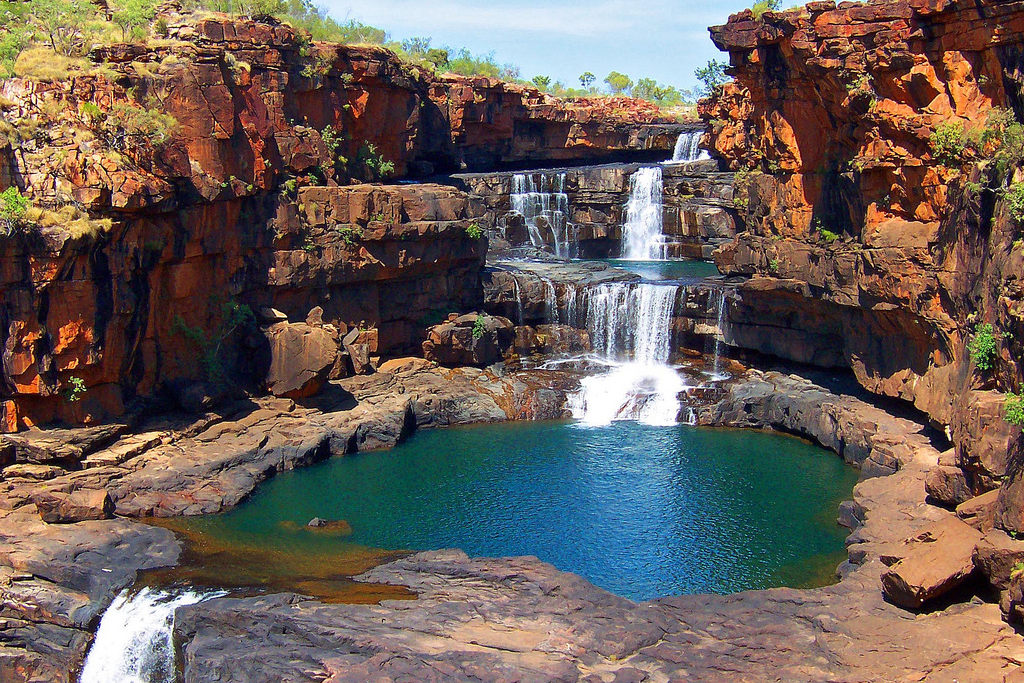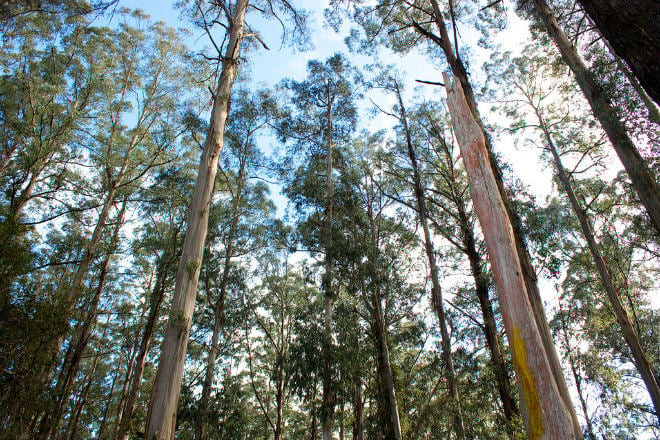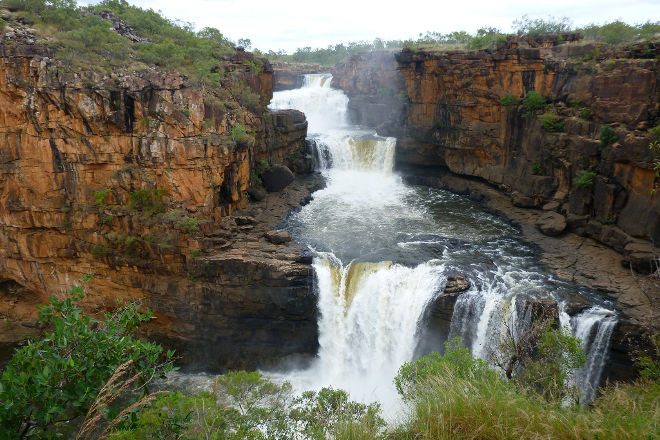The WA Government And Two Mining Companies Are Voluntarily Cancelling A Mine In The Kimberley
They're putting a national park there instead. Are they feeling okay? Should we call a doctor?

You probably haven’t heard of the Mitchell Plateau of the Wunambal people, located in the remote Kimberly region in Western Australia, but you should have. It features the magnificent Mitchell Falls, which cascade down jagged, sandstone blocks into a deep pool home to saltwater crocodiles, towering gorges carved by ancient rivers and Aboriginal rock art dating back over 40,000 years.
For decades this extraordinary landscape has been on death row. The Alumina Refinery (Mitchell Plateau) Agreement 1971 handed the region to Rio Tinto and Alcoa and permitted them to mine the vast bauxite deposits found beneath the earth and build an alumina refinery.
But now the Mitchell Plateau is to remain alive after the West Australian Government, Rio Tinto and Alcoa decided to cancel the agreement. Colin Barnett, the state’s Premier, has promised there will be no future mining projects in the 175,000 metre area, which will now be included in the soon-to-be-established Kimberly National Park. At five million hectares, it will be the largest national park in Australia. “The Mitchell Plateau and the Mitchell Falls are spectacular and unique landscapes in Australia and will be the jewels in the crown of the new Kimberley National Park,” the Premier said in a media release last week.
–
Being Green vs. Making Green
This is stranger news then the Prime Minister eating a raw onion — twice. Had Barnett announced the mine was to be opened next week, there would have undoubtedly been community uproar at the news, but no surprise. Why? Because it’s standard practice for fat cats in government and at the helm of giant mining companies around Australia to put the environment at the bottom of the ‘I-Don’t-Give-A-Shit’ pile.
In fact, trashing iconic natural regions seems a hobby of Australian governments today; state and federal governments don’t seem bothered that the world’s largest coral reef is on its way to becoming as unique and bleached as a blank white piece of paper thanks to the expansion of the Abbot Point coal terminal, which will generate increased shipping traffic and require the dredging of five million tonnes of sea bed. Governments of various political stripes are also supporting nine new mines in Queensland’s Galilee Basin which will feed the port and emit 705 million tonnes of carbon dioxide, making the region the seventh largest source of emissions in the world — and that’s with the knowledge that excess emissions are the leading threat to the reef. In Tasmania, meanwhile, a 1.58 million hectare wilderness region that UNESCO describes as “one of the last expanses of temperate rainforest in the world” is once again at risk of being spoiled by logging and large tourism developments.

The Tasmanian Wilderness World Heritage Area. (Image via Rexness/Flickr CC.)
The premise of these policies is simple: profit trumps nature. The jobs to be created and revenue to be raised by development makes the environmental consequences redundant. It’s easy to imagine those behind these policies clicking their heels with a sinister, Christopher Pyne-like smile on their faces exclaiming, “Never mind the trees or the coral or the fish – it’ll all grow back. There’s money to be made!”
So why was the Mitchell Plateau spared? Why did the West Australian government and a mining giant who sees the world through dollar-sign lenses sacrifice 456 million tonnes of the highest grade bauxite — worth around $912 billion — for the sacredness of a bloody waterfall? Perhaps Premier Barnett had a divine revelation that nature matters delivered to him from the ghosts of the sixty-eight sharks killed under his shark cull trial last year.
–
Baby Steps: Mines Being Nice
Australia’s current political scene is so fanciful that an explanation like that isn’t out of the question. But as entertaining as it is, the real reason is a little more mundane; increasing competitiveness from Chinese bauxite and alumina refineries and smelters meant the project was no longer economical. Which follows the trend of mining around the country, with many other companies throwing down their tools and economists declaring Australia is all boomed out.
But even if the mine had been economically viable, Rio Tinto CEO Sam Walsh said his company wouldn’t have begun digging because of the significant environmental impact. “To fully understand you need to go there and you need to physically see it. It is iconic. There’s no question in my mind that this is an iconic area that needs to be preserved for future generations,” he told the ABC. “Generally, bauxite deposits are fifteen metres deep but across a wide expanse. You could not mine this area without impacting on the environmental and heritage aspects.”

Image via Matt Francey/Flickr CC.
Although that sounds admirable, it’s hard not to be a little cynical. What area can be mined without impacting the environmental and heritage aspects? Who judges that the environments where other mines are situated around Australia aren’t “iconic”? And given Rio Tinto’s track record with its mines in Australia and internationally, it’s hard to view the company as a defender of the natural world. In December 2013, a 1,400 cubic metre tank holding uranium oxide slurry and acid at a Rio Tinto mine in the Northern Territory collapsed, and at the West Papuan Grasberg Mine, jointly owned by Rio Tinto and Freeport, there have been more environmental disasters than space here allows even outlining.
Nevertheless, the decision by Rio Tinto, Alcoa and the Barnett government to save the Mitchell Plateau from being taken to with a giant drill is a win for environmentalists, whatever the motives behind it. But does it signal a complete reordering of priorities within Australian governments? Probably not. Claiming so would be as logical as saying loggers are the ultimate conservationists.
Perhaps the only way for this reordering to happen is for politicians to stop spending their leisure time flying to expensive birthdays in even more expensive jets and to see these sublime natural environments with their own eyes. Maybe then, tears might flow not because of the fumes of a raw onion but because of how beautiful the world in front of them is. And maybe then, when they return to their parliamentary office, they will take the environment off the ‘I-Dont-Give-A-Shit’ pile.
–
Feature image via NeilsPhotography/Flickr CC.